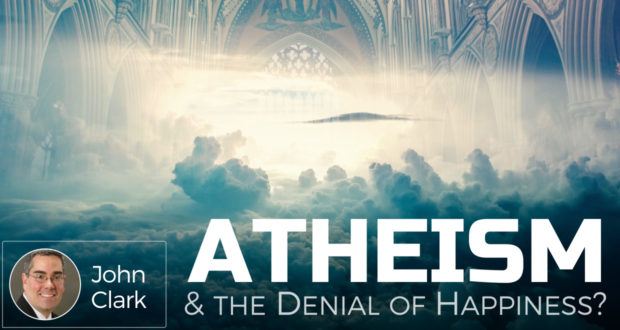I recently read a blog by Father Dwight Longenecker titled: “Twelve Reasons Why I Never Argue With Internet Atheists.” Although I see Father’s point (or twelve points), perhaps some of us are called to do so.
Particularly as “new atheism” (an example of great marketing, since “new atheism” bears a striking resemblance to “old atheism”) grows in popularity and influence, the objections of atheism must produce Catholic replies. Apologetics was a required course at the college I attended, and I have a feeling that my professor intended me to use my knowledge—on the internet and otherwise.
As many have observed, it is impossible to have much of a discussion or debate until the parties involved find some area of agreement, and finding common ground between theists and atheists is no easy task. So in the spirit of honest debate and charitable argument, let’s begin with stating a few things on which we can perhaps agree—both of which having to do with the subject of happiness.
First, man desires happiness. While there’s not much that theists and atheists can agree on, we should be able to agree on this. It might surprise non-Catholics to know just how serious we Catholics are about happiness.
In our faith, it’s a pretty big deal. For instance, Saint Thomas Aquinas (from “Five Proofs” Fame) wastes no time getting to the topic of happiness in his Summa Theologica. In fact, he begins the Prima Secundae of the Summa by illustrating that man’s last end (or final purpose) is happiness.
Second, perfect happiness in this life is impossible. Earthly happiness is marred by discord such as physical, psychological, and emotional pain, sickness, and poverty. Speaking of perfect happiness, Saint Thomas says that it is a “perfect and sufficient good” that “excludes every evil, and fulfills every desire.” That is not the sort of happiness we experience in this life. Here on earth, our happiness is transitory and lacking.
Even when our most rhapsodic moments—days at the beach, wedding receptions, paydays, the kisses, the parties—hit their highest notes, they are irretrievable and transitory. As one author observed, “life is not a game of perfect.” And it’s surely not a game of perfect happiness. (Yet, we Catholic are grateful to God for imperfect temporal happiness, and recognize our true happiness as a foreshadowing of Heaven.)
For atheists and Catholics alike, the best that this life offers us is imperfect happiness: we can be happy about our health, wealth, fame, and pleasure—but it’s still imperfect.
Of course, the Catholic has an additional source of admittedly imperfect happiness, and that is the belief that God loves him and desires to love him forever. The imperfections of happiness are a bit easier to stomach if one knows that perfect happiness awaits. Like a child traveling to his favorite destination who keeps asking if he’s “there yet,” we believe that our father loves us enough to get us to that wonderful destination.
And I’ll gladly accept imperfect and transitory happiness on the road to a happiness that is both perfect and permanent. For all its potholes and detours, it’s not a bad road to be on.
By contrast, the atheist offers no destination, only an imperfect road—a veritable bridge to nowhere. The emptiness of emptiness.
Of course, none of this proves that a random theist is happier than a random atheist.
On a personal level, it’s worth noting that I’ve never seen an unhappy person working in a Catholic soup kitchen. If I were having a rough day and I needed to see happy people right away, I know just where I’d go: I would stand outside a confessional and look at people’s faces as they came out—repentant, confessed, absolved. And happy. Or maybe I’d go to a ceremony in which a young couple was having their baby baptized. I’ve never seen a dour couple at their child’s baptism.
But again, these are merely personal anecdotes. The world abounds with unhappy Catholics—those who are unhappy for medical and psychological reasons and a vast array of other reasons. The new atheism highlights unhappy Christians, and ridicules the happy Christians. St. Teresa of Avila often prayed: “May God protect me from gloomy saints.”
In contrast, the atheist seems to say, in a would-be prayer: “May I be protected from happy saints.” The happy saints seem to upset the intellectual apple-cart of atheism.
Moreover, there are articles and blogs from atheists assuring us that they are, in fact, happy people. Many atheists will simply tell you that they are happy, and that’s that.
But individual happiness aside, we can make a broader observation—and here is where we disagree—atheism preaches the impossibility of perfect happiness.
Simply put, if perfect happiness is impossible in this life, and this life is all there is, then perfect happiness is impossible. At its core, atheism argues not merely that a perfect God is a fiction, but that perfect happiness is a fiction. Atheism is a religion (or irreligion) that denies not merely the existence of God, but denies the possibility of perfect happiness.
However, Catholics believe that perfect happiness is our intended destiny. This is achieved by being in the Presence of the source of all happiness: God Himself. As Thomas puts it: “Final and perfect happiness can consist in nothing else than the vision of the Divine Essence.” Obviously, this stands in diametric contrast to atheism.
What is perfect happiness like? It lacks nothing. It fulfills everything. Past that, words fail.
Looking at an atheist site recently, I noticed that someone made the comment that Heaven must be “boring.” “Boring” implies a lack, yet perfect happiness equals fulfillment. It’s impossible to be bored in Heaven. Eternal life is a game of perfect: perfect happiness because of our proximity with the Source of all happiness.
For our part, we Catholics need to talk more about the perfect happiness of Heaven. The faithful—and the unfaithful—need to hear about Heaven. We need to pray for the grace to desire Heavenly happiness. Jesus does not reveal many specifics about what Heaven is like; much of it is taught by allegory and analogy, but Jesus tells us why.
He reveals that Heaven is a place of such profound happiness that it is inexpressible in human words and inconceivable to our fallen human minds on earth. St. Paul writes that: “No eye has seen, no ear has heard, and no mind has imagined what God has prepared for those who love him.”
Scripture is telling us that as good as we think the perfect happiness of Heaven is, it is better.
Unimaginably better.
Cathedrel overlay CC Fr Lawrence Lew, O.P.

 Seton Magazine Catholic Homeschool Articles, Advice & Resources
Seton Magazine Catholic Homeschool Articles, Advice & Resources










































